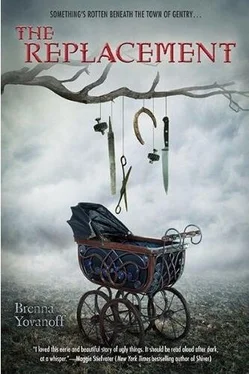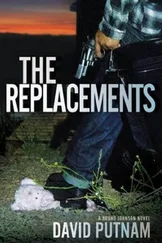I sat back down on the edge of the bed with the Gibson propped across my knees and played a walking bass line that peaked and dropped and grew until I could feel it in my own heartbeat.
When I woke up a while later, someone was calling my name.
I rolled off the bed, untangling myself from cables and cords. I’d dozed off with my headphones on. From the floor, the amp hummed softly in the gloom and I felt hazy and numb. Outside, the sky was dark.
The house was very bright, which meant my dad was home. He has this thing for electric lights. If a switch can be flipped, he’ll flip it. When I stepped out onto the landing, I had to shut my eyes against the glare.
“Malcolm,” he called from the kitchen. “Come in here, please.”
I went downstairs, blinking and shading my eyes with my hand.
He was at the table, and I could tell from his expression and his necktie that he’d just gotten back from the church. From Natalie Stewart’s funeral. His face was round and generally friendly, but right now it looked sort of raw. I wanted to ask about the service but didn’t know what to say.
He was flipping through a pile of old sermons and making notes on them. His suit coat was slung over the back of a chair. He glanced up when I came in but didn’t put his pen down. He looked tired and sort of exasperated, like he could hardly wait for the day to be over.
“Do you want to talk about why I got a call from the attendance office this afternoon?” he said.
“They had the blood drive at school. . . .”
He watched my face, rolling the pen between his fingers. “Today wasn’t a good day for doing things that could get you singled out. I’m assuming they announce something like that ahead of time?”
“I forgot,” I said. “Anyway, it’s not like it was some huge crisis.”
“Malcolm,” he said. “Your entire responsibility is not to make them see.”
I stared down at the linoleum. “I didn’t.” After a second, I glanced back up at him. “I don’t .”
He arranged his sermons in a neat pile, lining up the edges. Then he got up and went to the counter. He got out a plastic knife and started using it to cut an apple into slices. I wanted to ask why he didn’t just pick up the apple and eat it like a normal person, but everyone has their own private quirks.
After mangling the apple for a while, he threw the knife into the sink. It bounced like a pick-up-stick and snapped in half. “Why are there no paring knives in this house?”
“The good one’s in the cupboard. Above the refrigerator,” I said when he gave me a blank look.
My mother moves cutlery around like she’s playing chess. Sometimes, she throws it out. Anything that can’t be plastic or ceramic is aluminum. Anything that isn’t aluminum, she hides.
He opened the cupboard, sorting through the pile of knives and stainless steel flatware, and took the paring knife back to the counter.
I watched his back as he sliced the apple. His shoulders were tight. He smelled like aftershave and this tense, sharp smell he gets when he’s stressed out.
“I was thinking,” he said without turning around. “Missy Brandt mentioned that it might be nice to have someone come in and help with the preschool class once in a while. Is that something you’d be interested in?”
I had a feeling that Missy hadn’t mentioned it, that this was something he’d come up with on his own, and of course she’d said yes because what else can someone say when the minister asks you to babysit his sideshow of a son?
When I didn’t answer, he glanced over his shoulder. “Is something wrong? I thought it might be a good solution. This way, you have an official place in the congregation.”
I dug my fingernails into my palms and tried to get my voice under control. “It’s just so . . . messed up .”
“Well, it might take you a few weeks to get used to being around little kids, but I think you’ll do fine if you just give it a chance.” He sighed, shaking his head. “That’s the trouble with you and your mother. Both of you, you take a situation and start inventing obstacles right away. You never just give things a chance to get better.”
So, we were back to the sticky politics of choosing sides. On one side, me and my mom—pessimistic realists, always. On the other side, my dad and Emma, glowing with all the ways the world could be good, and I couldn’t just agree with them because I didn’t really believe it. But I wanted to.
I picked at the tablecloth, then stopped because it was making me look uncertain, and that wasn’t how I felt. I meant what I had to say to him. I just didn’t want to say it. “Dad, this doesn’t have anything to do with giving things a chance. This is just how it is and it’s not going to magically get better. I’m not ever going to be able to just live my life like everyone else.”
My dad turned toward the window so I couldn’t see his face. “Don’t say that again. None of this is because of you.”
I leaned my head back and closed my eyes, feeling a deep, pulsing ache in the middle of my chest, like someone was hitting me. “It is because of me. You don’t even treat me the same way you treat Emma.”
That made him breathe out in a harsh gust, almost a laugh. “You’re nothing like Emma. I try my best to figure out what you need, but it’s hard. It’s never been obvious with you, but that doesn’t mean I don’t try. That’s all we can do, really—try to do the right thing.”
I was about to tell him that the right thing was to go with what worked and not put me in charge of a bunch of little kids when Emma came in. She shuffled across the kitchen and opened the refrigerator. I stopped talking and my dad kept his back to both of us.
Emma rummaged through the vegetable drawer for a while, then looked at us. “You didn’t have to be so rude to Janice,” she said, and at first, I thought she meant me.
My dad set down the knife and turned to face her. “You know we have rules about unexpected guests.”
We do have rules. We have a lot of rules. Roswell can come over, but only because my dad trusts him. A random acquaintance might be tipped off by our lack of canned food and metal kitchen utensils.
My dad raked his hands through his hair. “Both of you, please . This family is an extremely visible part of the community and we need to be conscientious about the image we’re projecting.”
Emma closed the refrigerator, hard. “What image ? We weren’t embarrassing you. She was over so we could go through the seed experiment.”
“Well, this isn’t really the ideal place for a study session. Could you meet at the library, maybe?”
She put her hands on her hips. “Unfortunately, they have a policy about setting up germination trays at the library.”
“Well, what about that nice little bookstore downtown? Or a coffee shop?”
“Dad!”
They glared at each other, but neither of them said anything.
They were the loud ones in the family, always shouting or laughing. I thought how strange it was that they were also the ones who’d perfected the art of a wordless argument. They could communicate just by the various ways they breathed in or out.
My dad made a huffing noise and Emma rolled her eyes and looked away.
She was standing against the refrigerator, staring at the floor. Suddenly, she leapt forward and hugged him around the waist like she was apologizing. They stood with their arms around each other and I knew that there’d never been any question about whether he’d hug her back.
She pressed her face against his shirt and said, “You better put that knife back when you’re done. Mom hates it when the kitchen gets disarranged.”
Читать дальше












